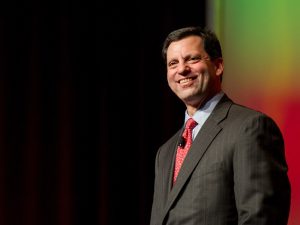Frank Bisignano is certainly prepared to lead a company during challenging times.
Aside from being on the front lines during 9/11 and surviving throat cancer, the industry vet has made a name for himself leading firms through tough times. During the financial crisis, he worked alongside Jamie Dimon to save Bear Stearns. He was also co-chief operating officer at JPMorgan Chase, where he previously worked as CEO of mortgage banking. He also held leadership positions at Citigroup in the company’s Global Transaction Services unit.
While leading First Data, he served as chairman and CEO, turning the 48-year-old company into a technology innovator, as well as boosting their balance sheet and leading its $2.6 billion initial public offering (IPO) in 2015. Last year, the company was bought by Fiserv for $30 billion, delivering shareholders a 100 percent return. The acquisition is the second biggest fintech deal of all time
After the acquisition, Bisignano lead Fiserv’s integration efforts, coronavirus response, and global businesses. In April, the company announced that its Board of Directors had unanimously elected him to succeed Jeffery Yabuki as Chief Executive Officer, starting July 1.
One of Bisignano’s main priorities has been keeping the company’s employees well taken care of during the pandemic. One key initiative was giving Fiserv’s frontline workers a 25 percent pay boost for the duration of the pandemic. “Eighty-five percent of our workers are working from home,” Bisignano told Fortune. “But we need thousands of workers to staff our call [and] data centers and production facilities.”
In addition, Yabuki and Bisignano gave up 100 percent of their cash compensation, and the next 18 highest-ranking executives took 20 percent pay cuts, with Fiserv putting the money into a “hardship fund” for employees and their families who are experiencing financial stress. And instead of laying off people or slashing salaries, Fiserv is cutting expenses by suspending its contributions to 401(k) plans for the time being.
“We don’t want to hurt our people in the short run by either laying off people, or cutting salaries,” said Bisignano. “The world they’re living in has radically changed—we don’t want to change it more by hurting their livelihoods.”
























